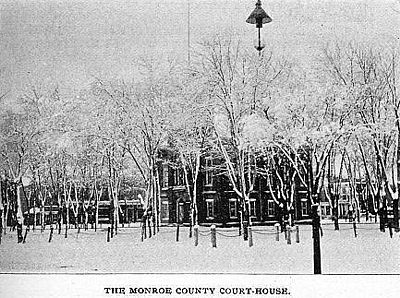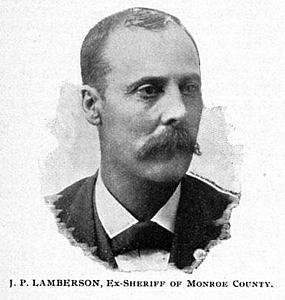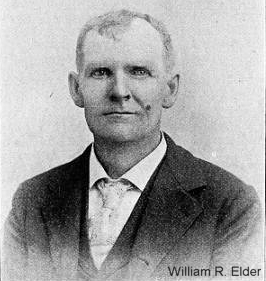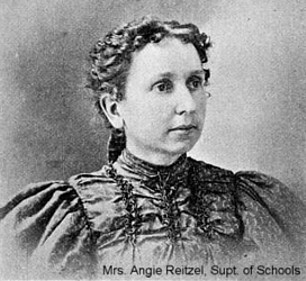Excerpts from An Illustrated History of Monroe County, Iowa - 1896
CHAPTER IX ~ COUNTY GOVERNMENT.
When the county was first organized, it was under the triumvirate of three officers, known as the Board of County Commissioners. Their duties were restricted mainly to the organizing of townships within the county, the laying out of town plats, the location of public highways, the levying of taxes, the canvass of election returns, and the auditing of public claims and accounts. Their duties were identical with those of the Board of Supervisors of the present day.
W. G. Clark was the first man to be elected to a public office in the county. He was elected justice of the peace in August, 1844.
Following is a list of County Commissioners given in the order of their election from 1845 to 1851, when their office was discontinued:
- Joseph McMullen, Jas. S. Bradley, Moses H. Clark, Jeremiah Miller, clerk
- Wm. McBride, Andrew Elswick, Smith Judson, Dudley C. Barber, clerk
- Andrew Elswick, Wm. McBride, George R. Holliday
- Smith Judson, George Golliday, John Clark
- Geo. R. Holliday, John Clark, Lewis Arnold
- Geo. W. Piper was clerk from 1849 to 1851.
From 1851 to 1861 the county was under the rule of an autocracy, consisting of a single officer, called the County Judge. Those who served as County Judges were D. A. Richardson and James Hilton. In 1855 J. N. Massey was elected to the office, but it was decided that he was ineligible to the office, owing to the fact that when elected he held the office of School-fund Commissioner. John Phillips was his opponent, and as he was also incumbered with a Federal office, being postmaster of Albia, the office was declared vacant, and Judge Richardson held over. The case was contested by John Webb, and Judge Richardson, Lewis Arnold and Hillah Hayes constituted the tribunal to try the case. They held that the office was vacant.
It was during Judge Hilton's term that the construction of Monroe County's present court-house was begun. There was considerable opposition to its construction at the time, and especially to its location in the town park, which did not comprise a part of the town plat set apart for public buildings. Judge Hilton, however, bluntly ordered the structure built in the center of the park, and the order was obeyed.

The Sentinel, at the time stated that two designs of architecture were submitted, and that the design chosen by Judge Hilton was the worse of the two, being after the architecture of the Tudors. In later years it seems that none of the county's citizens have ever refused to become an occupant of the building on account the alleged medieval style of architecture. . . so long as he gets a chance to occupy the building.
In 1861 the office of County Judge was abolished by an act of the Legislature, and another Supervisor system adopted. It consisted of one member from each of the twelve townships.
Those who served as members from 1861 to 1871, when the plan was further changed so that the number of members was restricted to three, as at the present time, were as follows, serving in the order of their enumeration:
- 1861: John Clark, W. G. Clark, John Hayes, Hiram Hough, John Kirby, W. A. Lamaster, John McFarland, William Mercer, D. J. Prayther, Warren Rall, J. M. Richardson, Sebastian Streeter
- 1862: Michael Campbell, John Clark, T. C. Crouch, H. Hough, W. A. Lamaster, J. McFarland, Wm. Mercer, R. W. Moss, C. L. Osburn, D. J. Prayther, Samuel Richmond, J. R. Stock
- 1863: M. Campbell, John Clark, T. C. Crouch, Henry Freeland, Hiram Hough, Lot King, W. A. Lamaster, R. W. Moss, C. C. Osburn, Joseph Robb, J. R. Stock, W. F. Walker
- 1864: Wareham G. Clark, H. Freeland, G. W. Gammond, W. B. Hill, Lot King, W. A. Lamaster, R. W. Moss, C. C. Osburn, Joseph Robb, J. R. Stock, W. F. Walker
- 1865: J. L. Anderson, Washington Atkins, W. G. Clark, W. A. Dean, S. G. Finney, H. Fullerton, W. B. Hill, W. A. Lamaster, W. H. H. Lind, C. C. Osburn, J. R. Stock, R. M. Thompson
- 1866: J. L. Anderson, W. V. Bedle, W. A. Dean, T. H. Duncan, S. G. Finney, H. Fullerton, J. R. Hurford, W. A. Lamaster, W. H. H. Lind, L. McGuirk, O. P. Rowles, R. M. Thompson
- 1867: W. V. Beedle, John Clark, D. Cross, T. H. Duncan, S. G. Finney, J. R. Hurford, Wm. Kelsey, W. A. Lamaster, J. McCormick, L. McGuirk, O. P. Rowles, S. Wyckoff
- 1868: John Clark, D. Cross, S. G. Finney, G. W. Grass, R. A. Hewitt, Jas. Hilton, J. R. Hurford, Wm. Kelsey, W. A. Lamaster, J. McCormick, L. McGuirk, S. Wycoff
- 1869: Samuel Bain, J. Findlay Jr., S. G. Finney, Lewis Henninger, Jas. Hilton, J. S. Hogeland, J. R. Hurford, Wm. Jenkins, W. A. Lamaster, W. R. Ross, H. R. Teller
- 1870: Samuel Bain, J. Findlay Jr., Lewis Henninger, J. S. Hogeland, Wm. Jenkins, V. G. Kemper, W. D. Kinser, W. A. Lamaster, L. McGuirk, G. W. Reading, W. R. Ross, H. R. Teller
The members of the present system were:
- 1871: P. T. Lamber, C. A. Miller, H. R. Teller
- 1872: John Clark, C. A. Miller, H. R. Teller
- 1873: John Clark, Wm Hardy, C. A. Miller
- 1874: J. B. Bell, John Clark, H. L. Vosburg
- 1875: John Clark, Wm. Mercer, H. L. Vosburg
- 1876: John Clark, Joseph Nichol, H. L. Vosburg
- 1877: John Clark, Joseph Nichol, T. B. O'Bryan
- 1878: Val Fuller, Joseph NICHOL, T. B. O'Bryan
- 1879: Val Fuller, David Hammond, T. B. O'Bryan
- 1880: Val Fuller, J. R. Hurd, Thos. O'Bryan
- 1881: David Hammond, J. R. Hurd, Thos. O'Bryan
- 1882: David Hammond, J. R. Hurd, Geo. Kerr*
- 1883: J. R. Hurd, Wm. Mercer, Thos. O'Bryan
- 1884: J. B. Castner, W. A. Koontz, Thos. O'Bryan
- 1885: J. B. Castner, Thos. O'Bryan, Herman Snow
- 1886: J. B. Castner, Herman Snow, John Walsh
- 1887: Edward Canning, Herman Snow, John Walsh
- 1888:Henry Berry, Edward Canning, John Walsh
- 1889: Henry Berry, Edward Canning, William Lahart
- 1890: Henry Berry, Edward Canning, William Lahart
- 1891: Henry Berry, Edward Canning, William Lahart
- 1892: Henry Berry, Edward Canning, William Lahart
- 1893: Henry Berry, William Lahart, Geo. L. ROBB
- 1894: Wm. Lahart, Geo. L. Robb, Elmer Thayer
- 1895: J. C. Currier, Geo. L. Robb, Elmer Thayer
- 1896:J. C. Currier, Wm. Davis, Elmer Thayer
- * NOTE: Mr. Kerr died soon after election, and Wm. Mercer was elected to fill the vacancy.
Sheriffs
1845 - John Clark; 1847 - Ezra P. Coen; 1851 - D. Durrall; 1853 - Willis Aarnold
1855 - John Porter; 1857 - E. R. Rockwell; 1859 - Riley Wescoatt; 1861 - E. P. CoenN
1865 - A. J. McDonald; 1871 - J. M. Robb; 1877 - Samuel F. Miller
When the Monroe County Bank went down, October 11, 1882, Sheriff Miller was involved in the affair in some manner, and resigned the office of Sheriff. The County Board of Supervisors appointed Martin Clever to fill the unexpired portion of his term up to the time for holding the general election, when P. L. Hoskins was elected for the remainder of the vacant term.

John M. Menan was elected in 1884, but was incompetent to fill the office and resigned. The County Board appointed W. W. O'Bryan to fill the vacancy up to election, and J. W. Lewis was elected to fill the remaining portion of the vacancy.
L. T. Richmond served one term, in 1886; C. M. Forest then served two terms, and J. P. Lamberson served two terms.
The next is the present incumbent, Captain John Doner, who was elected in November, 1895, on the Populist ticket. He was elected in the face of a heavy Republican majority in the county, given to other nominees.
Probate Judges.
The office of Probate Judge was consolidated with that of County Judge, when the County Commissioner system was abandoned. After this change had taken place, there were three Judges elected. The entire list of these Judges was:
1845 - W. G. Clark; 1847 - Geo. W. Reading; 1862 - W. P. Hammond; 1863 - A. A. Mason; 1866 - Geo. Hickenlooper
The emoluments of the office were not quite so distinguished as those which attach to the title of a judge of the present day, but each official contrived to cling to the title, and for all intents and purposes it is just as good a title socially as if prefixed to the name of a member of the Supreme Court.
Clerks of Court
1845 - Jas. Hilton; 1848 - Jonas Wescoatt; 1850 - Jacob Webb; 1854 - S. E. L. Moore; 1856 - Sam'l Buchanan; 1858 - W. E. Neville; 1860 - Henry Miller; 1867 - Josiah T. Young; 1873 - John W. H. Griffin; 1896 - Henry McCahan
Circuit Judge.
Henry L. Dashiell held the office of Circuit Judge from 1869 to 1873.
County Auditor.
On the suspension of the office of Probate Judge, in 1868, the office of Auditor was created to take its place.
Geo. Hickenlooper, who was Probate Judge when the Auditor's office was created, performed the Auditor's duties for one year; Samuel T. Craig then held the office until December 30, 1877; John W. Moss succeeded to the office in 1878; Edward A. Canning, 1883; A. J. Cassaday, 1885; J. W. Van Gilder, 1887; John R. Clark, 1892; B. P. Castner, 1894 to 1896.
Treasurer.
T. G. Templeton, 1845; C. W. Anderson, 1846; John Webb, 1855; D. A. Noble, 1856; John M. Wilson, 1860; John R. Duncan, 1862; Harrison Hickenlooper, 1866; John R. May, 1870; Harrison Hickenlooper, 1874; Edward McDonald, 1876; John W. Moss, 1880; David Hammond, 1885; John C. Coffman, 1889; John M. M. Roberts, 1895-6.
Recorder.
In 1865 the office of Recorder was created. Prior to that time the functions of the Recorder were performed by the Treasurer. John R. Duncan, who was Treasurer when the change was made, held the office of Recorder until 1867, when Jas. Coen was elected in that year; Calvin Barnard, 1869; J. R. Castle, 1875; C. W. Prindle, 1878; Ed. I. Ramsay, 1880; Boyd Miller, 1887; Ed. I. Ramsay, 1891; John Morrissey, 1894; Robt. Clapp, 1896.
School Superintendent.


Samuel Adams, 1855; E. M. Bills, 1856; J. W. H. Griffin, 1865; W. A. Nichol, 1869; Thos. Kelly, 1872; A. J. Cassady, 1875; Wm. E. Elder, 1879; H. J. Bell, 1881; D. W. Nevins, 1890; A. J. Henderson, 1894; Mrs. Angie Reitzel, 1896.
County Attorney.
In 1896 the office of the County Attorney was created. Prior to that time the Prosecuting Attorney's jurisdiction was coextensive with that of the judicial district, but it was found expedient to institute a change, owing to the increase of official duties devolving on the district prosecutor.
Those who have occupied the position in Monroe County are: Ed. Morrison, 1887; Fred Townsend, 1891; N. E. Kendall, 1896.
Coroner.
The office of Coroner in the earlier period of Monroe County's history was rather an intermittent one. Some times an officer was elected, and at other times the place was vacant, in which latter case the Sheriff was supposed to attend to any duties pertaining to the holding of inquests.
Some of those who have served as Coroner were: John Webb, Dr. Moses Cousins, Casper Dull, Jacob Webb, Wm. Webb, Maurice O'Connell, and Dr. Gray, the present incumbent.
Monroe County in the General Assembly.
Monroe County was represented in the State Senate by Jas. Davis, Barney Royston, H. B. Hendershot, D. Anderson, Warren S. Dungan, W. C. Shippen, E. M. Bills, Martin Read, A. C. Reck, H. L. Dashiell, A. A. Ramsay, Dr. Cassatt, and T. B. Perry, the present Senator, elected from the Monroe Marion district. In the House by Chas. Anderson, Wm. M. Allison, N. B. Preston, Henry Allen, M. A. Goodfellow, Samuel Gossage, John Reitzell, L. O. Haskell, O. P. Rowles, John Clark, H. L. Dashiell, A. A. Ramsay, B. F. Elbert, Jas. Hilton, L. O. Haskell, A. M. Giltner, R. W. Duncan, J. M. Robb, Jas. Hogeland, A. A. Ramsay, J. C. Robinson, Austin Jay, and D. H. Scott.
Monroe County Agricultural Society.
In a financial sense, the Monroe County Agricultural Society never prospered.
The society was organized in 1853, and the officers were Joseph Sherod, president; Wm. Robinson, vice-president; V. K. Read, secretary.
In 1858 Elisha Hollingshead was made president; and Lewis Arnold, John Castle, Sr., W. W. Fall, E. P. Cone, Michael Lower, J. W. Boyd, Andrew Lamaster, Gordon Pike, John Walker, D. Gladson, W. H. H. Lind, and Hancock were made vice-presidents. P. T. Lambert was corresponding secretary and J. M. Humphrey recording secretary; John Clark was elected treasurer.
In 1886 the society reorganized as a corporate body, so as to receive the annual fund appropriated by the State to the agricultural societies of the various counties in the State.
In 1885 or 1886 the Society ceased to hold its annual fairs and since then the organization has dissolved as a corporate body. The grounds on which the fairs were held, situated about a mile northeast of Albia, are now [1896] owned by Mr. Geo. Walton, and the inclosing wall has nearly all fallen down. The first county fairs were held in Mock's addition to the city of Albia, just north of Dr. Gutch's present residence.
The Albia Post-Office.
Dudley C. Barber was the first postmaster at Albia. He held the office until 1849; John Marck held until 1851; John Phillips until 1861; Wm. Collins until 1865; Jas. H. Morris until 1866; Thos. G. Craig held the office for about three months, but was superseded by Mr. Morris, who again held the office until he was succeeded by Van Mendel in 1877. In 1882 J. P. Early succeeded Mendel, and held the office until 1886. A. J. Weber, of the Albia Democrat, was appointed by the Cleveland administration, and after some months' delay in the Senate securing the confirmation of his appointment, he took the office and conducted it until 1888, when he resigned on the election of Harrison to the Presidency.
A. R. Barnes was appointed to the place under Harrison's administration, and served nearly four years, when he was bounced for "intense partisanship," by the next Cleveland administration, a few months before his commission expired.
In 1881, when President Garfield was assassinated, and Chester A. Aarthur was sworn in as President, J. P. Early became an aspirant for the Albia post-office, then being held by Val Mendel, who was appointed at the beginning of Hayes' term of office. M. E. Cutts, the member of Congress from the Sixth District, declined to use his influence in behalf of either party — at least, it was so understood. Mr. Mendel, however, went to Washington and learned, as he states, that Mr. Cutts never presented his petitions and endorsements to the Department. He accused Mr. Cutts of secretly furthering the interests of Mr. Early. He accused Hon. B. F. Elbert with the commission of all the alleged trickery resorted to in securing the appointment of Early.
Charges of fraud were bandied back and forth from one aspirant to the other, but the general public took little interest in the matter, and cared still less which man got the office. Both were popular men in the county, and each represented a distinct faction of the Republican party in the county.
In this connection it may not be out of place to note the lack of unity of the Republican party in Monroe County. which has existed for some years, and which exists at the present day. Sometimes this spirit of dissension is so bitter that it has more than once proven the instrument of bringing defeat to the party.
On the beginning of Mr. Harrison's term of the Presidency, Mr. Early and A. R. Barnes were aspirants for the post-office. Both men secured a formidable list of subscribers to their respective petitions. The contest waxed so warm that Mr. Lacy, the member of Congress from the Sixth District, declined to discriminate in behalf of either contestant, and finally settled the dispute by visiting Albia and inducing the interested parties to toss up a coin to end the contest. They tossed, and Mr. Barnes won the place. To alleviate Mr. Early's probable disappointment, Mr. Lacy secured for him a Federal appointment as a special land agent in the West. He resigned the place some time later.
This latter contest has promoted some discord in the Republican ranks in the county, which continues to the present time, and will no doubt be revived and heightened should a Republican President be elected next November, calling forth the appointment of another postmaster for Albia. Mr. Barnes, it is understood, is already in the field, anticipating the election of Mr. McKinley to the Presidency.
Transcriptions by Sharon R. Becker, September of 2010

